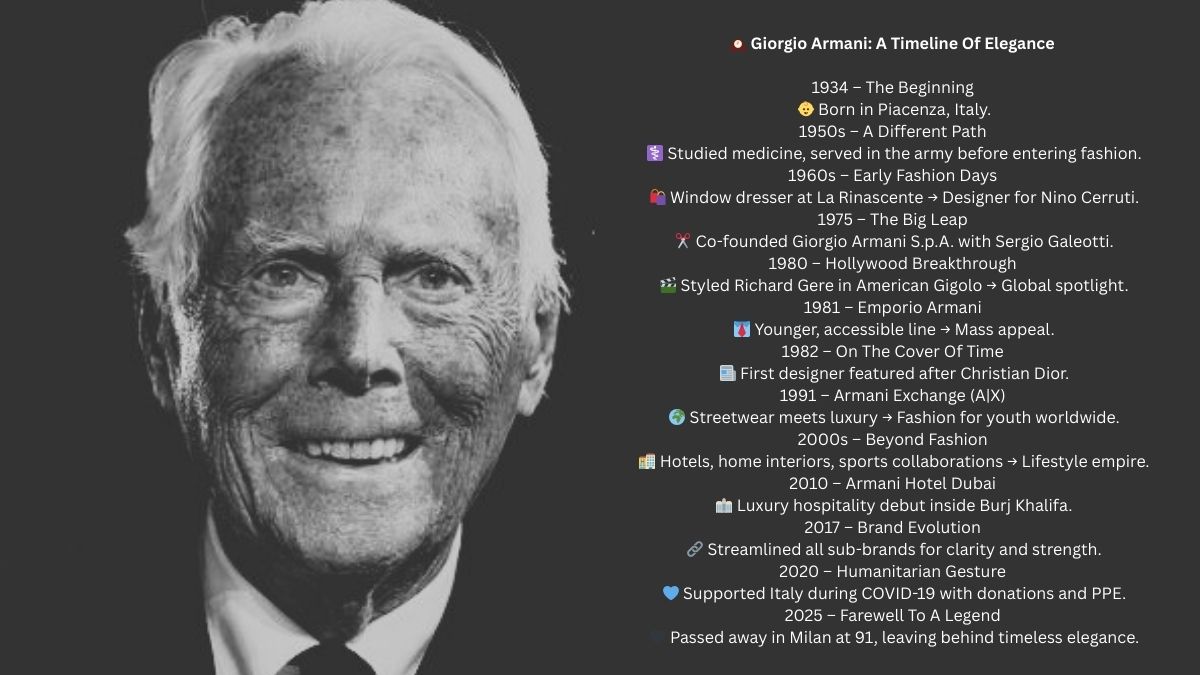Giorgio Armani (1934-2025): A Farewell To The Maestro Of Elegance
Legendary designer Giorgio Armani has passed away at 91. Discover his journey, timeless designs, Hollywood influence, and enduring legacy in fashion and lifestyle.

Italian Fashion Designer, Giorgio Armani Death News
Some names are stitched so deeply into the fabric of culture that their passing feels like losing a part of history itself. Giorgio Armani was one of those names. The Italian designer who transformed fashion with his quiet power and minimalist grace has left us at the age of 91. But to speak of Armani as just a designer would be an understatement. He was a dreamer, a visionary, and for millions across the globe, the man who showed that true elegance never shouts; it whispers.

Italian Fashion Designer, Giorgio Armani Death News; Photo Credit: X (Previously Twitter)
From Piacenza To The World
Armani's beginnings were humble. Born in Piacenza, Italy, in 1934, he first studied medicine, later served in the military, and eventually found his way into fashion almost by accident. From dressing windows at La Rinascente to sketching for Nino Cerruti, every step brought him closer to his destiny.
In 1975, with his partner Sergio Galeotti, he launched what would become one of the world's greatest fashion houses. He didn't follow the rules, he rewrote them. Jackets lost their stiffness, trousers found their flow, and power suits became about confidence rather than intimidation.
The Armani Signature: Confidence In Simplicity
Armani's genius was subtle. At a time when fashion often chased excess, he championed restraint. His soft tailoring redefined masculinity. His women's suits redefined authority. His gowns were less about sparkle and more about silhouette.
For Armani, style wasn't about shouting for attention. It was about being remembered without trying too hard. And that is why, decades later, his designs still feel as modern as the day they first appeared.
Hollywood's Designer, The World's Dreamer
Few moments cement a designer's legacy as firmly as Armani's Hollywood debut in American Gigolo. Richard Gere, dressed in Armani from head to toe, became an instant symbol of sophistication. The film didn't just sell suits, it sold a lifestyle.
From there, Armani's bond with Hollywood deepened. His designs walked every red carpet, graced countless Oscars, and became the silent partner to some of cinema's most iconic performances. To wear Armani was not just to dress, it was to embody elegance.
A Legacy That Touched Everyday Lives
Yet Armani's influence went far beyond celebrities. He knew that not everyone could own a couture gown, but everyone could own a piece of the Armani dream. His fragrances, eyewear, and accessories allowed millions to carry a little bit of his vision with them.
A bottle of Acqua di Giò on a dresser, an Armani Exchange watch on a wrist, or a pair of sleek sunglasses on a summer afternoon, these were not just products, they were memories, small tokens of confidence and sophistication that became part of daily life.
The Man Who Stayed Independent
In an industry dominated by powerful conglomerates, Armani stood apart. He refused to sell out, retaining control of his empire until the very end. He was not just the creative force but also the businessman, the strategist, the guardian of his brand's identity.
This independence is part of why Armani felt different. He didn't bend to the trends of Wall Street or the impulses of shareholders. His loyalty was to design, to his customers, and to his belief that elegance is eternal.
The World Pays Tribute
Today, tributes come not only from designers and celebrities but also from everyday people whose first perfume, first suit, or first special occasion dress carried his name. Italian leaders called him a cultural treasure. Fellow designers remembered him as a master of restraint. Fans remembered the quiet confidence he gifted them through his work.
His passing, just weeks before the 50th anniversary of his fashion house, feels bittersweet. What was meant to be a celebration of his journey has become a farewell to its author.
An Enduring Legacy
But legends do not fade, they evolve into legacy. Armani ensured this by creating the Giorgio Armani Foundation, a guardian of his vision and values. His empire will live on, but more importantly, so will the philosophy he built:
- That simplicity is strength.
- That elegance is timeless.
- That true style empowers rather than overwhelms.
As the world mourns Giorgio Armani, perhaps the greatest tribute we can pay him is to carry forward what he stood for. Not just in the clothes we wear, but in the way we present ourselves, with quiet confidence, with grace, and with authenticity.
Goodbye, Maestro. The suits may hang in closets, the perfumes may linger in the air, but your elegance will forever live in the world you dressed.
| Attribute | Details |
|---|---|
| Full Name | Giorgio Armani |
| Born | 11 July 1934, Piacenza, Italy |
| Died | 4 September 2025, Milan, Italy |
| Age | 91 years |
| Profession | Fashion Designer, Entrepreneur |
| Known For | Minimalist tailoring, soft-shouldered suits, timeless power dressing |
| Breakthrough | Designed Richard Gere's wardrobe in American Gigolo (1980) |
| Global Influence | Red carpets, Hollywood films, world leaders, and business professionals |
| Brands | Giorgio Armani, Emporio Armani, Armani Privé, Armani Exchange, EA7, Armani Casa |
| Beyond Fashion | Fragrances, eyewear, accessories, interiors, luxury hotels |
| Business Style | Independent, retained full control of Armani empire |
| Legacy |
A philosophy of elegance, simplicity, and timeless design |
Frequently Asked Questions (FAQs)
Q1. Who was Giorgio Armani?
An Italian designer and global icon, known for redefining fashion with minimalist elegance and timeless tailoring.
Q2. What made Armani unique?
His philosophy of “less is more” and his ability to make simplicity powerful and enduring.
Q3. Did Armani influence Hollywood?
Yes, he dressed countless stars for films, premieres, and award shows, beginning with American Gigolo in 1980.
Q4. How did Armani impact everyday people?
Through accessible luxury fragrances, eyewear, and accessories that carried his design ethos.
Q5. What is his lasting legacy?
A fashion empire that remains independent, and a philosophy of elegance that transcends time.

























